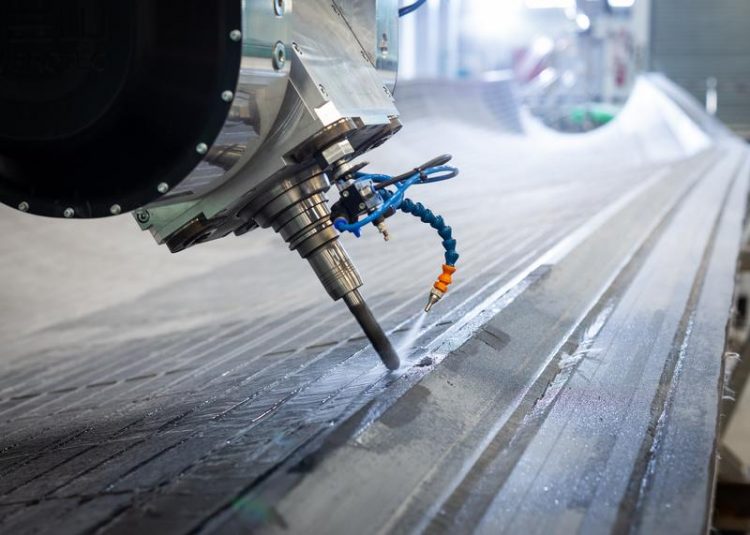BladeFactory research project: Quicker rotor blade production and a higher quality result

As part of the direct tooling process the CFRP surface of the mold is milled to the final geometry. Jan Meier
Using the technology presently available, it takes around 24 hours to produce a rotor blade blank. The process is protracted since almost all production steps must be performed one after the other in the main mold tool.
“To shorten the production time, we want to perform various processes simultaneously and move some of the work away from the main mold tool to other devices”, explained the project’s manager Roman Braun. This includes procedures such as preforming (placement and draping of the textile and core materials) and prefabbing (preproduction of rotor blade components).
Another goal is quality enhancement: In order to achieve greater, reproducible component quality, the researchers at IWES rely on measuring technologies and mechanical tests during the manufacturing process. In addition, the use of a laser measurement system is planned which will precisely record the 3D geometry of the finished parts.
“The introduction of robust and parallel production processes offers huge potential cost savings. The production procedure is rendered more efficient and material surcharges as well as reworking due to quality issues can be reduced”, explained Roman Braun.
A direct production procedure for mold tools was developed in the scope of the preceding project, BladeMaker. This has reduced the production time for molds from six to three months. In the BladeFactory project, researchers now aim to use this production procedure to create mold tools with a cooling function.
This will enable the curing process to be optimally controlled and shortened, whilst also increasing the quality of the components. The more rapid manufacturing of mold tools accelerates the market launch of rotor blades significantly which results in a decisive competitive advantage for manufacturers.
Development work will be performed at IWES’ own demonstration center for industrialized rotor blade production in Bremerhaven, Germany. This site was established within the framework of the preceding BladeMaker project.
The demonstration center is open to project partners and industry customers. Material manufacturers, machine suppliers and blade producers use the infrastructure and know-how offered by Fraunhofer IWES to test materials and tools for blade production, perform demonstrations to potential customers and conduct tests according to accredited methods.
Media Contact
All latest news from the category: Machine Engineering
Machine engineering is one of Germany’s key industries. The importance of this segment has led to the creation of new university degree programs in fields such as production and logistics, process engineering, vehicle/automotive engineering, production engineering and aerospace engineering among others.
innovations-report offers informative reports and articles covering technologies such as automation, motion, power train, energy, conveyor, plastics, lightweight construction, logistics/warehousing, measurement systems, machine tools and control engineering.
Newest articles

NASA: Mystery of life’s handedness deepens
The mystery of why life uses molecules with specific orientations has deepened with a NASA-funded discovery that RNA — a key molecule thought to have potentially held the instructions for…

What are the effects of historic lithium mining on water quality?
Study reveals low levels of common contaminants but high levels of other elements in waters associated with an abandoned lithium mine. Lithium ore and mining waste from a historic lithium…

Quantum-inspired design boosts efficiency of heat-to-electricity conversion
Rice engineers take unconventional route to improving thermophotovoltaic systems. Researchers at Rice University have found a new way to improve a key element of thermophotovoltaic (TPV) systems, which convert heat…



